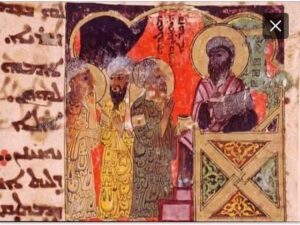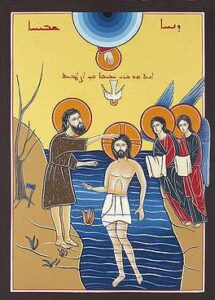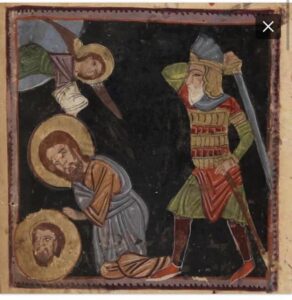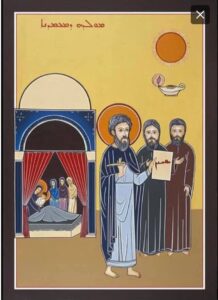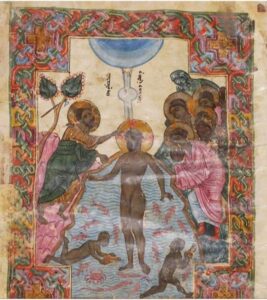يوحنا و يحيى هما شخص واحد .
يوحنا و يحيى هما شخص واحد .
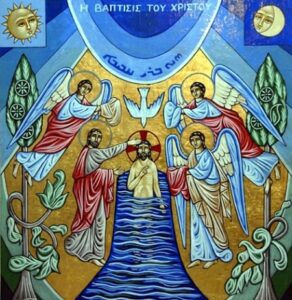
Yuhanna (John) and Yahya are one person.
يوحنا و يحيى هما شخص واحد .
تعيد الكنيسة غداً عيدَ الغطاس ، أي معمودية السيد المسيح ، كلمة الله ، من القديس يوحنا المعمدان بن زكريا وإليصابات ، صلاتهم معنا .
وتعيّد بعد يوم غد عيدَ إستشهاد يوحنا المعمدان الذي قطع رأسه الملك هيرودس .
كان ليوحنا تلاميذ كثر . فبعد إستشهاه ، أخذوا جثمانه واحتفظوا به في قبر . وبعد إنتشار المسيحية وصلت ذخيرة منه ، وهي رأسه ، إلى كاتدرائية دمشق المعروفة اليوم بالجامع الأموي .
تعتبر ديانة ( الصابئية المندائية ) في العراق شخصَ يوحنا المعمدان النبيَّ المؤسس لها . وتنسب إليه كتابها المقدس المعروف ب ( دراشا د يهيا ) أي تعاليم يحيى .
إسم يوحنا يعني بالسريانية الآرامية (الرب حنَّان) . هو اسم مركب من (يو) هي إختصار ( يهوا ) أي الرب ، و (حنّا) تعني حنَّان .
أما إسم يحيى ، فبحسب دراستي الشخصية ، يعني بالآرامية ( الرب حي ) . وهو أيضاً اسم مركب من ( يَ) إختصار ( يهوا ) أي الرب ، و( حيا ) تعني حي .
وأعتقد بأن تلاميذه أطلقوا عليه إسم ( يحيى ) إيماناً منهم بأنه وإن مات فهو حيّ ، لأن الرب حيّ .
وفي القرآن الكريم ورد إسم يحيى إنسجاماً مع إسمه في الصابئية المندائية .
أشارككم أدناه :
1- دراسة علمية مختصرة آعددتها مؤخراً عن أصل إسم يحيى . وهي باللغة الانكليزية . أعتذر لعدم وجود ترجمة بالعربية لها . بإمكانكم وضعها على برنامج (ترجمة كوكل).
2- قراءة عن عماد الرب بحسب إنجيل القديس مرقس ، الاصحاح الاول
3- قراءة عن استشهاد القديس يوحنا
بحسب القديس مرقس ، الاصحاح 6
4- جميع الايقونات من الطقس السرياني
Yahya يحيى ، A Biblical Proper Name.
In the Qur’an, the name of John the Baptist is mentioned in five different verses as Yahya يحيى , whereas in the Arabic Bible, the name is Yuhanna يوحنا, and in Syriac is Yuhanon ܝܘܚـܢܢ . The form of Yahya يحيى looks very strange to Christian Arabs. The name Yuhanon ܝܘܚـܢܢ in Syriac, composed of Yu ܝܘ and Hanon ܚܰܢܳܢ , means ‘Yahweh has mercy’. Arthur Jeffery and Alfons Mingana agree with most scholars that Yahya is a development of Yuhanon. Also, Jeffry mentions that Spenger thinks that perhaps it might have come from Sabians. The following analysis will confirm that Spenger’s assumption is accurate.
The name Yahya يحيى in Arabic is thought to be derived from the noun Haya’ حياء , modesty or from the verb yahya يحيا , to live. The name Yahya يحيى and the verb yahya يحيا are pronounced the same but written with a different type of the letter alef at the end. No one from Arab culture has a name of a verb form. If the name Yahya يحيى was modelled to mean modesty, Haya’ حياء , there is no reason to change Haya’ حياء into Yahya يحيى . It seems to me that Yahya يحيى in the Qur’an was borrowed from the Aramaic sacred book ‘Drāšā d-Yaḥyā’ of Mandaeanism, whose followers are known in the Qur’an as Sabians, الصابئة al-Ṣābiʼah, and are considered as a People of the Book, along with Jews and Christians. It looks to me that the name Yahya يحيى is most probably of Aramaic Syriac origin. In Syriac, Yahya ܝـܚـܝܐ , is composed of two syllables. Ya ܝܰ stands for Yahweh and Hya ܚܝܐ stands for living. The most probable meaning of the word is ‘Yahweh is the Living One.’ In Mandaeanism, the name of John the Baptist is a compound name, Yahya-Yohanna. I believe that Yohanna is the original name of the John the Baptist and after his martyrdom, his followers added Yahya as a title to his name to indicate that he is still alive. (It is believed that the head of John the Baptist is still to be found in the Umayyad mosque in Damascus, which was once the Cathedral of Saint John the Baptist).
In general, Biblical names hold thoughtful meanings in both Judaism and Christianity. Most times a Biblical name is related to the message which the person is assigned for. The Arabic name Yuhanna يوحنا , derived from Syriac Yuhanon ܝܘܚܢܢ , meaning John, is given to John the Baptist by the angle because Yahweh had mercy upon his father Zachariah and his mother Elisabeth. Likewise, the Qur’anic name Yahya يحيى , derived from Syriac name Yahya ܝܚܝܐ , meaning ‘Yahweh is the Living One’, corresponds with the martyrdom which John the Baptist had obtained at the end of his preaching task. The name of Yahya still survives in the tradition of the Mandaeans in Iraq. It is an honouring name given to his martyrdom. The change of names of holy persons is common usage in Judaism and Christianity. For example, Abram and Jacob become Abraham and Israel, and Simon and Paul became Peter and Paul. The change of Syriac Yuhanon ܝܘܚـܢܢ into Yahya ܝܚܝܐ , Yahya يحيى , corresponds with the of change of names in Biblical tradition. Yahya ܝܚܝܐ , Yahya يحيى , adds a new dimension to the life of John the Baptist. He is not dead but is still alive through his martyrdom.
In Islamic tradition, one of God’s names is Hay حي , The Living One. The Qur’an mentions that God is the Living One (Surahs, 2:255, 3:2, 20:11, 25:58, 40:65), and most of the time the name Hay حي is followed by Alqayyum القيوم , he is Self-Sustaining. This corresponds with the Aramaic Book of Daniel (6:26), where God is hayya weqayyam חיא וקימ . The Syriac Peshitta gives a different order of the verse. It says: He is the Living God. And he is steadfast forever huyu Alaha haya. Uqayam l’olmin
ܗܘܝܘ ܐܠܗܐ ܚܝܐ . ܘܩܝܡ ܠܥܠܡܝܢ
. The Arabic translation of Daniel renders it the same as the Qur’an alhay alqayyum الحي القيوم , the Living and the Steadfast. One may consider that the martyrdom of John the Baptist is recalled by his new name Yahya, which continues throughout generations to give a true testimony to the Living One.
عماد الرب في نهر الاردن :
يوحنا المعمدان يعد الطريق (بحسب القديس مرقس – الاصحاح الأول) :
1 هَذِهِ بِدَايَةُ إِنْجِيلِ يَسُوعَ الْمَسِيحِ ابْنِ اللهِ: 2 كَمَا كُتِبَ فِي كِتَابِ إِشَعْيَاءَ:
«هَا أَنَا أُرْسِلُ قُدَّامَكَ مَلاكِي الَّذِي يُعِدُّ لَكَ الطَّرِيقَ؛ 3 صَوْتُ مُنَادٍ فِي الْبَرِّيَّةِ: أَعِدُّوا طَرِيقَ الرَّبِّ، وَاجْعَلُوا سُبُلَهُ مُسْتَقِيمَةً!» 4 فَقَدْ ظَهَرَ يُوحَنَّا الْمَعْمَدَانُ فِي الْبَرِّيَّةِ يُنَادِي بِمَعْمُودِيَّةِ التَّوْبَةِ لِمَغْفِرَةِ الْخَطَايَا. 5 وَخَرَجَ إِلَيْهِ أَهْلُ مِنْطَقَةِ الْيَهُودِيَّةِ وَأَهْلُ أُورُشَلِيمَ جَمِيعاً، فَكَانُوا يَتَعَمَّدُونَ عَلَى يَدِهِ فِي نَهْرِ الأُرْدُنِّ مُعْتَرِفِينَ بِخَطَايَاهُمْ. 6 وَكَانَ يُوحَنَّا يَلْبَسُ ثَوْباً مِنْ وَبَرِ الْجِمَالِ، وَيَلُفُّ وَسَطَهُ بِحِزَامٍ مِنْ جِلْدٍ، وَيَأْكُلُ الْجَرَادَ وَالْعَسَلَ الْبَرِّيَّ. 7 وَكَانَ يَعِظُ قَائِلاً: «سَيَأْتِي بَعْدِي مَنْ هُوَ أَقْدَرُ مِنِّي، مَنْ لَا أَسْتَحِقُّ أَنْ أَنْحَنِيَ لأَحُلَّ رِبَاطَ حِذَائِهِ. 8 أَنَا عَمَّدْتُكُمْ بِالْمَاءِ؛ أَمَّا هُوَ فَسَوْفَ يُعَمِّدُكُمْ بِالرُّوحِ الْقُدُسِ».
معمودية يسوع وتجربة الشيطان له
9 فِي تِلْكَ الأَيَّامِ جَاءَ يَسُوعُ مِنَ النَّاصِرَةِ بِمِنْطَقَةِ الْجَلِيلِ، وَتَعَمَّدَ فِي نَهْرِ الأُرْدُنِّ عَلَى يَدِ يُوحَنَّا. 10 وَبَمُجَرَّدِ أَنْ صَعِدَ مِنَ الْمَاءِ، رَأَى السَّمَاوَاتِ قَدِ انْفَتَحَتْ، وَالرُّوحَ القُدُسَ هَابِطاً عَلَيْهِ كَأَنَّهُ حَمَامَةٌ، 11 وَإذَا صَوْتٌ مِنَ السَّمَاوَاتِ يَقُولُ: «أَنْتَ ابْنِي الْحَبِيبُ، بِكَ سُرِرْتُ كُلَّ سُرُورٍ!»
12 وَفِي الْحَالِ اقْتَادَ الرُّوحُ يَسُوعَ إِلَى الْبَرِّيَّةِ، 13 فَقَضَى فِيهَا أَرْبَعِينَ يَوْماً وَالشَّيْطَانُ يُجَرِّبهُ. وَكَانَ بَيْنَ الْوُحُوشِ وَمَلائِكَةٌ تَخْدِمُهُ.
استشهاد يوحنا ( انجيل القديس مرقس ، الاصحاح السادس )
17ذلِكَ بِأَنَّ هيرودُسَ هذا كانَ قد أَرسَلَ إِلى يوحَنَّا مَن أَمْسَكَه وأَوثَقَه في السِّجْن، مِن أَجْلِ هيرودِيَّا امَرأَةِ أَخيهِ فيلِبُّس لأَنَّه تَزَوَّجَها. 18فكانَ يوحَنَّا يقولُ لِهيرودُس: «لا يَحِلُّ لَكَ أَن تَأخُذَ امرَأَةَ أَخيك». 19وكانَت هيرودِيَّا ناقِمَةً عليه تُريدُ قَتْلَه فلا تَستَطيع، 20لأَنَّ هيرودُسَ كانَ يَهابُ يوحَنَّا لِعِلمِه أَنَّه رَجُلٌ بارٌّ قدِّيس. وكان يَحْميهِ. وإِذا استَمَعَ إِليه، وقَعَ في حَيرةٍ كَبيرة، وكانَ مع ذلِكَ يَسُرُّه الإِصغاءُ إِليه. 21وجاءَ يومٌ مُوافِقٌ إِذ أَقامَ هيرودُسُ في ذِكْرى مَولِدِه مَأدُبَةً لِلأَشرافِ والقُوَّادِ وأَعْيانِ الجَليل. 22فدَخَلَتِ ابنَةُ هيرودِيَّا هذه ورَقصَت، فأَعجَبَت هيرودُسَ وجُلَساءَه. فقال المَلِكُ لِلصَبِيَّة: «اُطلُبي مِنِّي ما شِئْتِ أُعطِكِ». 23وأَقسَمَ لَها: «لأُعطِيَنَّكِ كُلَّ ما تَطلُبينَ مِنِّي، ولَو نِصفَ مَملَكَتي». 24فخَرَجَت وسأَلَت أُمَّها: «ماذا أَطلُب ؟» فقالت: «رأَسَ يوحَنَّا المَعمَدان». 25فدَخَلَت مُسرِعَةً إِلى المَلِكِ وطَلَبَت فقالَت: «أُريدُ أَن تُعطِيَني في هذِه السَّاعَةِ على طَبَقٍ رأسَ يوحَنَّا المَعمَدان». 26فاغتَمَّ الملِك، ولِكِنَّه مِن أَجلِ أَيمانِه ومُراعاةً لِجُلَسائه، لم يَشأ أَن يَرُدَّ طلَبَها. 27فأَرسَلَ المَلِكُ مِن وقتِهِ حاجِباً وأَمَرَهُ بِأَن يَأتيَ بَرأسِه. فمَضى وقطَعَ رأسَه في السِّجْن، 28وأَتى بِرأسِ يوحَنَّا على طبَقَ، فأَعطاه لِلصَّبِيَّة والصَّبِيَّةُ أَعطَتْه لِأُمِّها. 29وبَلَغَ الخَبَرُ تَلاميذُه، فجاؤوا فَحمَلوا جُثمانَه ووضَعوه في قَبْر.
